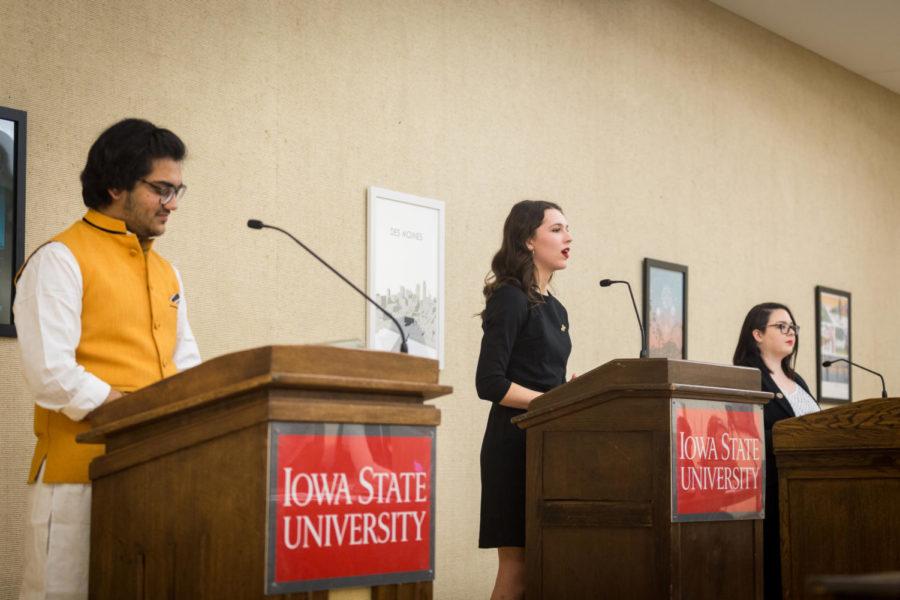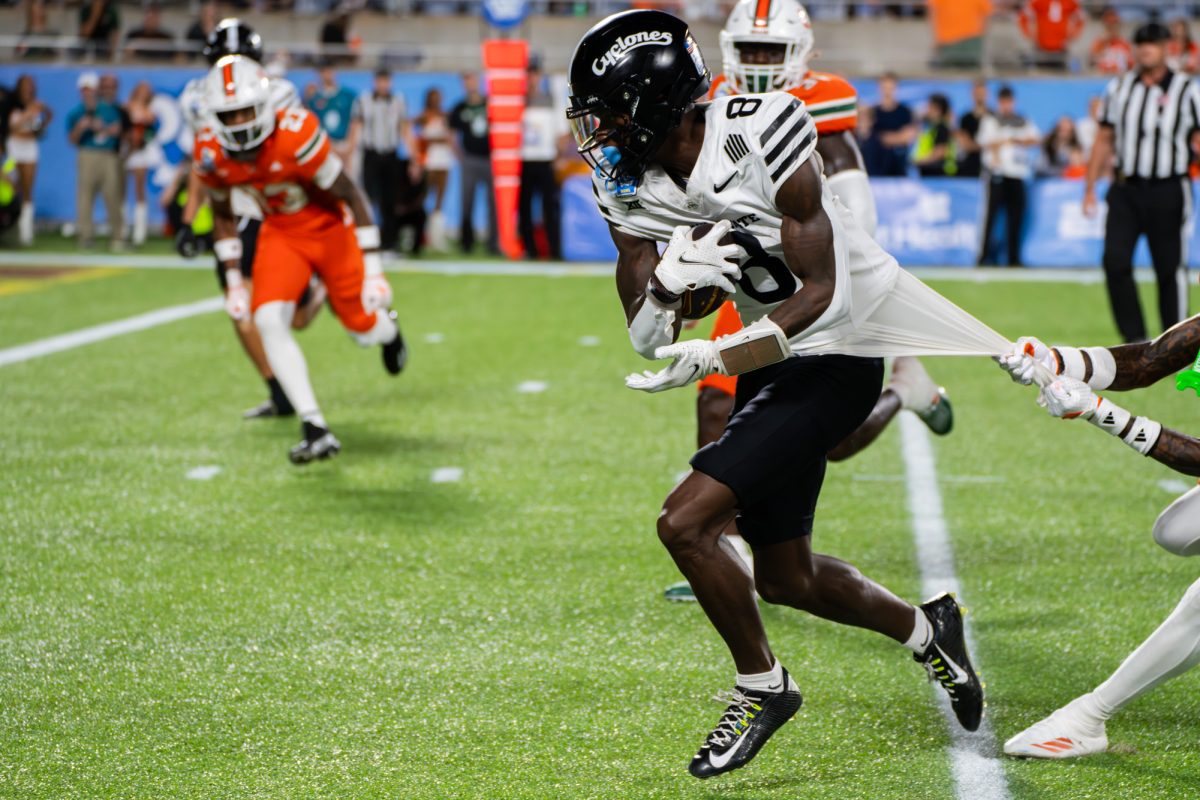Vice presidential candidates debate inclusion, student wellness
February 19, 2019
A spring festival, increased parking and an emergency rent assistance fund were all topics at the first debate of the Student Government election season.
The three candidates for vice president of Student Government debated about the community, campus inclusivity, student wellness and Student Government issues Tuesday at the Memorial Union.
Annaliessa Michelotti emphasized her lack of Student Government experience as an asset throughout the debate, saying being an outsider would allow her to “relate to Cyclones a lot more.”
Conversely, Analese Hauber touted her campaign with Cody Woodruff as the slate with the most experience in Student Government, with Woodruff having three years of experience and Hauber having one. Hauber said the connections they have made through Student Government will allow them to get more students involved, which she said is the real goal of their campaign.
Vishesh Bhatia spoke to his campus involvement outside of Student Government as a highlight of his campaign. Bhatia and his running mate Austin Graber are both community advisers and Cyclone Aides.
Community issues
Michelotti’s campaign advocates for increasing parking availability on campus, which she said can be done through finding “eco-friendly options” through discussions with Iowa State’s Parking Divison — something she said her campaign has already begun working with.
The Michelotti campaign is also proposing bringing a spring festival back to Iowa State, and moderators asked how their festival would be different from the VEISHEA festival, which was banned from Iowa State after it ended with riots in 2014.
Michelotti said she and Whittington do not want to bring VEISHEA back to Iowa State but would like to “revise a spring festival” by creating a safe and fun environment to celebrate Cyclone pride.
“When talking to alumni of Iowa State University, they have told us that they don’t donate to Iowa State because we don’t hold the same values that we once held when they went to school here,” Michelotti said.
Hauber said private donations, including those from alumni, would fund her campaign’s emergency rent assistance program, which would help students being threatened with eviction.
“[Alumni] provide us so many great opportunities through their donations, and we want to look at how we continue supporting each other in the Cyclone community, not just while we’re on campus but after we’ve left,” Hauber said.
Inclusivity
The top reason students experience exclusionary conduct on campus, according to the campus climate survey, is because of gender or gender identity, with nearly one third of transpectrum respondents reporting experiencing exclusionary conduct.
Candidates were asked how they would ensure transgender students are being supported and listened to on campus, and all agreed the issue was important, with Michelotti saying the issue was personally important because she has transgender family members and wants Student Government to remember people of all backgrounds should be included.
Bhatia emphasized the importance of pronouns and making sure students are using them correctly.
Bhatia was specifically asked about a quote on his campaign site in which he says “the iconic thing about Iowa State is that we all proudly call ourselves Cyclones.” Moderators asked him how he plans to reach students that aren’t “traditionally involved on campus.”
Bhatia, who said he is part of the campus climate response team, said the Tree of Oppression can act as a tool to involve more students on campus and initiate conversations about diversity.
An audience-submitted question also described the Tree of Oppression as a “contentious issue” and asked candidates how they would represent multicultural students on campus and what experience they have with multicultural students.
All candidates spoke to their experience working with multicultural communities on campus. In her response, Hauber referenced the survey recently sent to students from Student Government asking for feedback on the Tree of Oppression.
“I think rather than focusing on potentially knowledge of the tree, we need to work more on focusing on responses to the feedback survey that was sent out a couple weeks ago because there was some really disturbing responses to that, and we need to focus on changing the culture,” Hauber said.
Bhatia spoke to negative perceptions of the tree as well, saying he feels as if people see the Tree of Oppression in a negative way because of the word “oppression.”
“We want to change that conversation in a positive way where we can build that platform to talk about different identities and how much it matters to everyone, every student, every Cyclone on campus,” Bhatia said.
Student wellness
At its last meeting, Student Government passed a bill to fund STD testing for 300 ISU students during the remainder of the semester. During the meeting, senators debated about Student Government’s role in funding student health care. At the debate, candidates were asked what they believe that role should be or if it should be left to “health care facilities on campus.”
All candidates agreed the issue was important and expressed an interest in long-term solutions and ensuring students know about health care resources available on campus.
The candidates also agreed on expanding mental health resources on campus and outreach by those organizations.
Hauber discussed the possibility of raising the student health fee to pay for resource expansion.
“Through ‘unconditional support,’ we want to expand our health services on campus,” Hauber said. “If that means raising our student health fee 50 cents to $1 per semester, that could provide thousands and thousands of dollars to help with not only education but services we could provide to our students.”
Student Government issues
Historically, Student Senate has had low retention rates and currently no students are running to represent Frederickson Court or the College of Design, and only one student is running to represent the College of Engineering.
When asked how they would alleviate strains on the Senate from lacking retention rates, all candidates stressed encouraging inclusivity and a sense of community in the Senate. Regarding recruitment efforts, all candidates spoke about reaching out to student organizations.
In discussing Student Government issues, Michelotti spoke to being a Student Government outsider and how it has influenced her perspective of Student Government and her conversations with students.
Michelotti said she wants to make Student Government more accessible by updating its website and moving it out of West Office Space.
“I do not believe Student Government is transparent enough with their students,” Michelotti said. “Students, again, they don’t know what Student Government is. A lot of students that I have talked to personally have gone on to the Student Government website and tried to find out ‘what is Student Government? What are they doing right now? Where is my money going?’ and it’s just ‘page not found,’ after ‘page not found,’ after ‘page not found.’”
Hauber, a current senator in Student Government, said she does not believe Student Government is hiding anything but could improve outreach by encouraging senators to advertise their office hours more, which she described as one of Student Government’s “greatest downfalls right now.”
Bhatia, also a current senator, said his campaign plans to reach out to student organizations that are not otherwise connected to Student Government, through programs such as reverse town halls.







